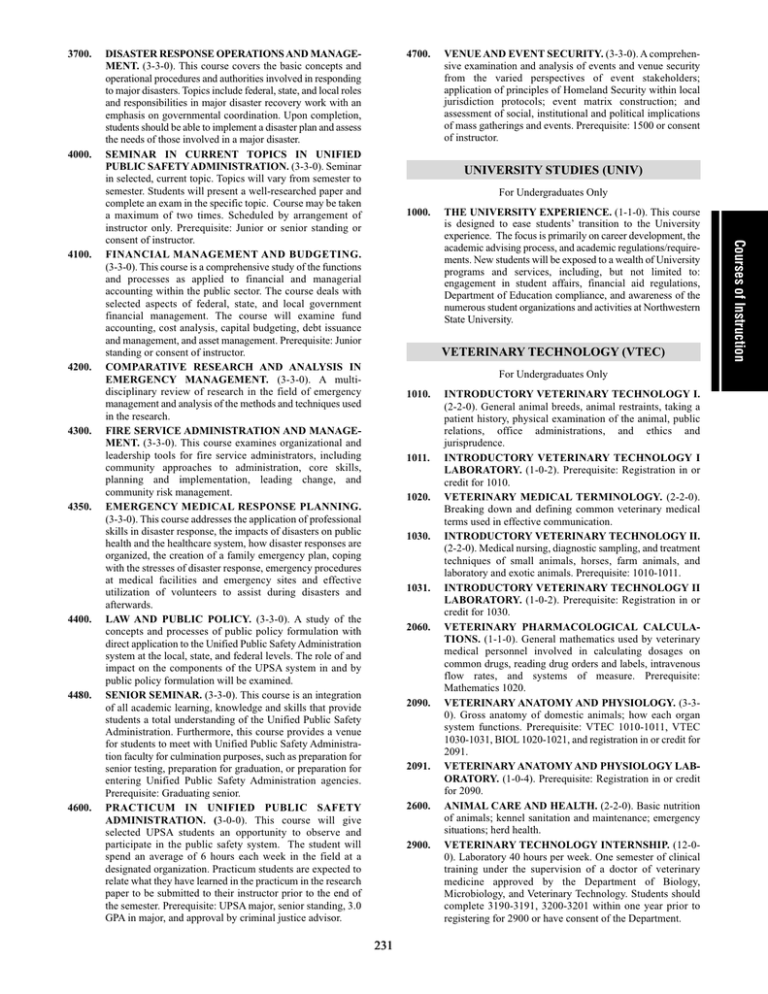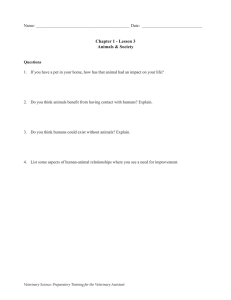Veterinary Technology Course Descriptions - biology
advertisement

3700. 4000. 4200. 4300. 4350. 4400. 4480. 4600. 4700. VENUE AND EVENT SECURITY. (3-3-0). A comprehensive examination and analysis of events and venue security from the varied perspectives of event stakeholders; application of principles of Homeland Security within local jurisdiction protocols; event matrix construction; and assessment of social, institutional and political implications of mass gatherings and events. Prerequisite: 1500 or consent of instructor. UNIVERSITY STUDIES (UNIV) 1000. For Undergraduates Only THE UNIVERSITY EXPERIENCE. (1-1-0). This course is designed to ease students’ transition to the University experience. The focus is primarily on career development, the academic advising process, and academic regulations/requirements. New students will be exposed to a wealth of University programs and services, including, but not limited to: engagement in student affairs, financial aid regulations, Department of Education compliance, and awareness of the numerous student organizations and activities at Northwestern State University. VETERINARY TECHNOLOGY (VTEC) 1010. 1011. 1020. 1030. 1031. 2060. 2090. 2091. 2600. 2900. 231 For Undergraduates Only INTRODUCTORY VETERINARY TECHNOLOGY I. (2-2-0). General animal breeds, animal restraints, taking a patient history, physical examination of the animal, public relations, office administrations, and ethics and jurisprudence. INTRODUCTORY VETERINARY TECHNOLOGY I LABORATORY. (1-0-2). Prerequisite: Registration in or credit for 1010. VETERINARY MEDICAL TERMINOLOGY. (2-2-0). Breaking down and defining common veterinary medical terms used in effective communication. INTRODUCTORY VETERINARY TECHNOLOGY II. (2-2-0). Medical nursing, diagnostic sampling, and treatment techniques of small animals, horses, farm animals, and laboratory and exotic animals. Prerequisite: 1010-1011. INTRODUCTORY VETERINARY TECHNOLOGY II LABORATORY. (1-0-2). Prerequisite: Registration in or credit for 1030. VETERINARY PHARMACOLOGICAL CALCULATIONS. (1-1-0). General mathematics used by veterinary medical personnel involved in calculating dosages on common drugs, reading drug orders and labels, intravenous flow rates, and systems of measure. Prerequisite: Mathematics 1020. VETERINARY ANATOMY AND PHYSIOLOGY. (3-30). Gross anatomy of domestic animals; how each organ system functions. Prerequisite: VTEC 1010-1011, VTEC 1030-1031, BIOL 1020-1021, and registration in or credit for 2091. VETERINARY ANATOMY AND PHYSIOLOGY LABORATORY. (1-0-4). Prerequisite: Registration in or credit for 2090. ANIMAL CARE AND HEALTH. (2-2-0). Basic nutrition of animals; kennel sanitation and maintenance; emergency situations; herd health. VETERINARY TECHNOLOGY INTERNSHIP. (12-00). Laboratory 40 hours per week. One semester of clinical training under the supervision of a doctor of veterinary medicine approved by the Department of Biology, Microbiology, and Veterinary Technology. Students should complete 3190-3191, 3200-3201 within one year prior to registering for 2900 or have consent of the Department. Courses of Instruction 4100. DISASTER RESPONSE OPERATIONS AND MANAGEMENT. (3-3-0). This course covers the basic concepts and operational procedures and authorities involved in responding to major disasters. Topics include federal, state, and local roles and responsibilities in major disaster recovery work with an emphasis on governmental coordination. Upon completion, students should be able to implement a disaster plan and assess the needs of those involved in a major disaster. SEMINAR IN CURRENT TOPICS IN UNIFIED PUBLIC SAFETY ADMINISTRATION. (3-3-0). Seminar in selected, current topic. Topics will vary from semester to semester. Students will present a well-researched paper and complete an exam in the specific topic. Course may be taken a maximum of two times. Scheduled by arrangement of instructor only. Prerequisite: Junior or senior standing or consent of instructor. FINANCIAL MANAGEMENT AND BUDGETING. (3-3-0). This course is a comprehensive study of the functions and processes as applied to financial and managerial accounting within the public sector. The course deals with selected aspects of federal, state, and local government financial management. The course will examine fund accounting, cost analysis, capital budgeting, debt issuance and management, and asset management. Prerequisite: Junior standing or consent of instructor. COMPARATIVE RESEARCH AND ANALYSIS IN EMERGENCY MANAGEMENT. (3-3-0). A multidisciplinary review of research in the field of emergency management and analysis of the methods and techniques used in the research. FIRE SERVICE ADMINISTRATION AND MANAGEMENT. (3-3-0). This course examines organizational and leadership tools for fire service administrators, including community approaches to administration, core skills, planning and implementation, leading change, and community risk management. EMERGENCY MEDICAL RESPONSE PLANNING. (3-3-0). This course addresses the application of professional skills in disaster response, the impacts of disasters on public health and the healthcare system, how disaster responses are organized, the creation of a family emergency plan, coping with the stresses of disaster response, emergency procedures at medical facilities and emergency sites and effective utilization of volunteers to assist during disasters and afterwards. LAW AND PUBLIC POLICY. (3-3-0). A study of the concepts and processes of public policy formulation with direct application to the Unified Public Safety Administration system at the local, state, and federal levels. The role of and impact on the components of the UPSA system in and by public policy formulation will be examined. SENIOR SEMINAR. (3-3-0). This course is an integration of all academic learning, knowledge and skills that provide students a total understanding of the Unified Public Safety Administration. Furthermore, this course provides a venue for students to meet with Unified Public Safety Administration faculty for culmination purposes, such as preparation for senior testing, preparation for graduation, or preparation for entering Unified Public Safety Administration agencies. Prerequisite: Graduating senior. PRACTICUM IN UNIFIED PUBLIC SAFETY ADMINISTRATION. (3-0-0). This course will give selected UPSA students an opportunity to observe and participate in the public safety system. The student will spend an average of 6 hours each week in the field at a designated organization. Practicum students are expected to relate what they have learned in the practicum in the research paper to be submitted to their instructor prior to the end of the semester. Prerequisite: UPSA major, senior standing, 3.0 GPA in major, and approval by criminal justice advisor. 3010. 3100. 3101. 3190. 3191. 3200. 3201. 3700. 3701. DISEASES OF ANIMALS. (3-3-0). Major diseases of the equine and companion animals including pathophysiology, etiology, and prevention. Prerequisite: VTEC 1010-1011, VTEC 1030-1031, BIOL 1020-1021. GENERAL VETERINARY PARASITOLOGY. (2-3-0). Ecto and endoparasites of animals; parasites of public health importance; control measures. Prerequisite: Registration in or credit for 3101; Biology 1010-1011, 1020-1021. GENERAL VETERINARY PARASITOLOGY LABORATORY. (2-0-4). Prerequisite: Registration in or credit for 3100. VETERINARY HOSPITAL TECHNOLOGY I. (2-2-0). Theory and techniques of hematology, urology, serology, cytology, bacteriology, microbiology, and mycology. Prerequisite: Registration in or credit for 3191; Biology 10201021. VETERINARY HOSPITAL TECHNOLOGY I LABORATORY. (2-0-4). Prerequisite: Registration in or credit for 3190. VETERINARY HOSPITAL TECHNOLOGY II. (2-2-0). Applied pharmacology, anesthesiology and surgical nursing. Pre-and post-operative care of animals. Prerequisites: Grade of C or better in 3190-3191, and 2090-2091, registration in or credit for 3201. VETERINARY HOSPITAL TECHNOLOGY II LABORATORY. (2-0-4). Prerequisite: Registration in or credit for 3200. VETERINARY RADIOLOGY AND IMAGING. (2-2-0). Theory and application of radiological and ultrasound principles. Prerequisites: Grade of C or better in 2090-2091, registration in or credit for 3701. VETERINARY RADIOLOGY AND IMAGING LABORATORY. (1-0-2). Prerequisite: Registration in or credit for 3700. 4090. 4200. 4900. 232 VETERINARY CLINICAL PHARMACOLOGY. (3-3-0). The science of veterinary pharmacology, including the types and actions of drugs used in veterinary medicine, indications and contraindications for these drugs, pharmacokinetics, pharmacodynamics, drug toxicity, pharmacological jurisprudence, and client education techniques. Prerequisite: 2060, 2090-2091. VETERINARY TECHNOLOGY COMPREHENSIVE REVIEW. (3-3-0). Comprehensive review of veterinary technology from basic to clinical sciences, pertaining to multiple animal species, including diagnostics and clinical applications, professional practices and issues. This course is designed to assist in preparing for board certification examination of veterinary technicians/technologists, and should be the final VTEC course taken to complete degree requirements. Prerequisite: All other required VTEC courses except VTEC 4900. VETERINARY TECHNOLOGY SPECIALTY INTERNSHIP. (6-0-6). 240 hours of clinical training under the supervision of a doctor of veterinary medicine or a credentialed veterinary technician approved by the Department of Biology, Microbiology, and Veterinary Technology. The goal of this internship is to expand veterinary exposure and offer added value options in specialized tracks, such as Laboratory Animal Medicine, Exotic Animal Medicine, Practice Management/Business, Research, Education, Emergency/Critical Care, Anesthesia, Clinical Laboratory Medicine, Dentistry, or Internal Medicine. Please see your advisor one semester prior to registration for this course so that site arrangements may be developed in a timely manner. Directed general course electives should assist in preparing the student for this course. Prerequisite: Completion of all other required VTEC courses.

